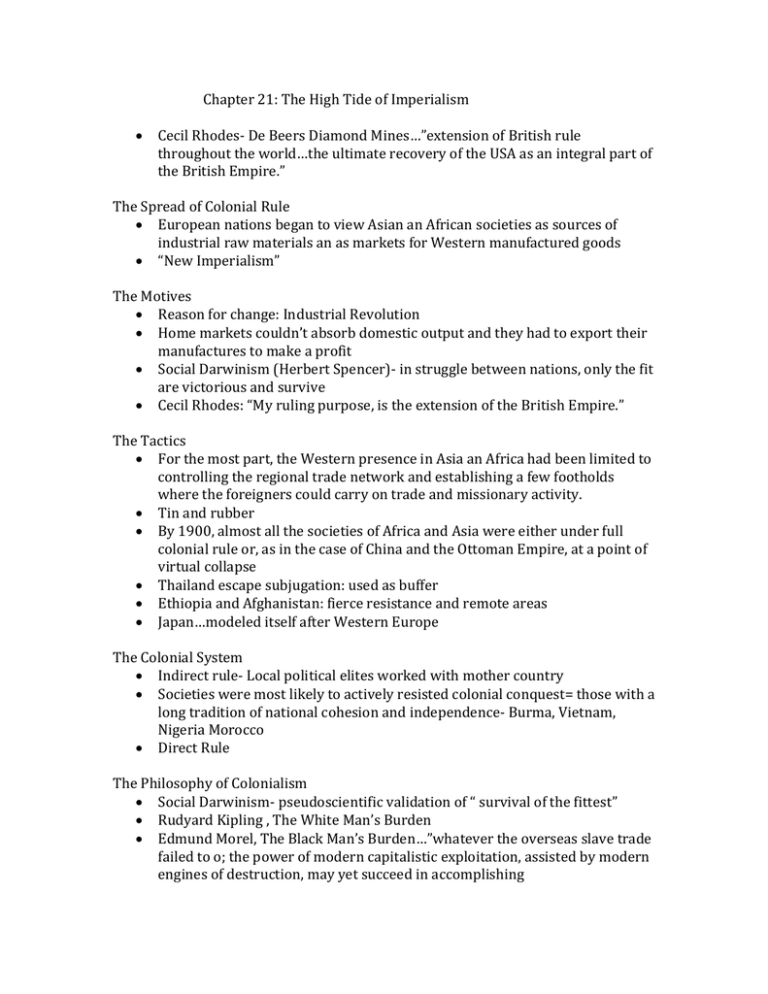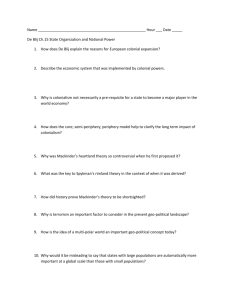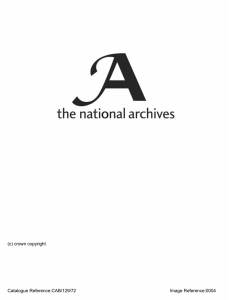Chapter 21: The High Tide of Imperialism
advertisement

Chapter 21: The High Tide of Imperialism Cecil Rhodes- De Beers Diamond Mines…”extension of British rule throughout the world…the ultimate recovery of the USA as an integral part of the British Empire.” The Spread of Colonial Rule European nations began to view Asian an African societies as sources of industrial raw materials an as markets for Western manufactured goods “New Imperialism” The Motives Reason for change: Industrial Revolution Home markets couldn’t absorb domestic output and they had to export their manufactures to make a profit Social Darwinism (Herbert Spencer)- in struggle between nations, only the fit are victorious and survive Cecil Rhodes: “My ruling purpose, is the extension of the British Empire.” The Tactics For the most part, the Western presence in Asia an Africa had been limited to controlling the regional trade network and establishing a few footholds where the foreigners could carry on trade and missionary activity. Tin and rubber By 1900, almost all the societies of Africa and Asia were either under full colonial rule or, as in the case of China and the Ottoman Empire, at a point of virtual collapse Thailand escape subjugation: used as buffer Ethiopia and Afghanistan: fierce resistance and remote areas Japan…modeled itself after Western Europe The Colonial System Indirect rule- Local political elites worked with mother country Societies were most likely to actively resisted colonial conquest= those with a long tradition of national cohesion and independence- Burma, Vietnam, Nigeria Morocco Direct Rule The Philosophy of Colonialism Social Darwinism- pseudoscientific validation of “ survival of the fittest” Rudyard Kipling , The White Man’s Burden Edmund Morel, The Black Man’s Burden…”whatever the overseas slave trade failed to o; the power of modern capitalistic exploitation, assisted by modern engines of destruction, may yet succeed in accomplishing Assimilation and Association French adopted “assimilation”- which implied an effort to transform colonial societies in the Western image and “association”- implying collaboration with local elites while leaving local traditions alone French vacillated between the two in Indochina and Africa, eventually fell back on rule by force British rejected assimilation because it inferred equality and instead treated their subject peoples as culturally and racially distinct US designed an assimilating policy for the Philippines, but didn’t always practice it. Primary objectives of colonial officials seemed to be economic exploitation an the retention of power, from the perspective of the repressed Colonialism in Action French often tried to impose a centralized administrative system in their colonies that mirrored the system in France British attempted to transform local aristocrats into the equivalent of the landed gentry at home in Britain Treatment also differed depending on the perceived economic benefit of an area India Under the British Raj By 1800, the empire of the Mughals had been greatly diminished by the British British expanded power from coastal areas to the interior British East India Company or local maharajas an rajas Colonial Reforms British governance over the Indian subcontinent did bring order and stability to a society that had been rent by civil war Heightened attention given to education New school system to train children of elites, under British administrator Thomas Babington Macaulay…British civil service examination was introduced Education extended to more girls to make them “better wives” Sati was outlawed and widows were legally permitted to remarry Attempted to control thuggee (thugs) Railroads, telegraph, postal service The Cost of Colonialism British Raj Economic Cost- British textiles severely damaged the local textile industries Rural areas, Zamindar System- local gentry took advantage of system and raised taxes and exploited the peasants Very limited industrialization Foreign rule also had a psychological effect on the Indian people Nabob- European residents in India Colonial Regimes in Southeast Asia 1800 only Spanish Philippines and Dutch East Indies…by 1900, virtually the entire area ha come under Western domination “Opportunity in the Orient”: The Colonial Takeover in Southeast Asia After Napoleonic Wars, Britain abandoned claims to Dutch East Indies and focused on the Malay peninsula Stamford Raffles- 1819 founded a new British colony on the island of Singapore, at tip of Malay peninsula…with steamship technology, became major refueling point. 1826: British attacked lower Burma French maintained a clandestine missionary organization in Vietnam 1858: French launched a naval attack on Vietnam and the Nguyen dynasty eventually ceded lands in the Mekong River delta to the French 1900- French also seized Cambodia and Laos an set up the French ruled Indochinese Union Thailand remained independent under King Mongkut and King Chulalongkorn…attempted to introduce Western learning without being conquered…Thailand as buffer between French and British 1898: US naval forces under Commodore George Dewey- defeated the Spanish fleet in Manila Bay…President William McKinley decided the “moral thing” to do was to turn the Philippines into an American colony to prevent them from falling into the hands of the Japanese Speech given in Senate in January 1900 by Senator Albert Beveridge of Indiana “The Philippines are ours forever, “territory belonging to the US,” as the Constitution calls them…And we will move forward to our work, not howling out regrets like slaves whipped to their burdens, but with gratitude for a task worthy of our strength, and thanksgiving to Almighty God that He has marked us as His chosen people, henceforth to lead in the regeneration of the world.”…(with God on our side) Emilio Aguinalo- led guerilla forces against the Spanish and the Americans The Nature of Colonial Rule In Southeast Asia, economic profit was primary goal Indirect rule was preferred Dutch East Indies…VOC entrusted local administration to the indigenous landed aristocracy…collected taxes and maintained law and order in exchange for payment from VOC Administration and Education Economic Development Colonialism and the Countryside Empire Building in Africa The Growing European Presence in West Africa Imperialist Shadow over the Nile Arab Merchants and European Missionaries in East Asia Bantus, Boers, and British in the South The Scramble for Africa Colonialism in Africa Indirect Rule The British in East Africa British Rule in South Africa Direct Rule, French Style High Colonialism Women in Colonial Africa The Emergence of Anticolonialism Stirrings of Nationhood Traditional Resistance: A Precursor to Nationalism Opposition to Colonial Rule in Africa The Sepoy Rebellion The Path of Collaboation Imperialism: The Balance Sheet



